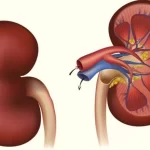Insufficient blood flow in the kidney
Diseases and conditions that can slow blood flow to the kidney and be responsible for renal failure include: loss of blood or fluid, blood pressure medications, heart attack, heart disease, Infections, liver failure, aspirin, ibuprofen, naproxen or use of related drugs, severe allergic reaction, severe burns, cabbage Dehydration;
Renal damage of kidneys
- The following conditions and factors of diseases can damage the kidney and cause acute kidneys failure
- Blood clots in the veins and arteries present in and around the kidneys.
- The blood flow to the kidneys is blocked due to the accumulation of cholesterol.
- Glomerulonephritis, inflammation in the small filters present in the kidneys.
- Hemolytic uremic syndrome (a condition arising as a result of the premature end of red blood cells).
Internal infection.
- Lupus, an immune system disorder that causes glomerulonephritis.
- Medications, such as some chemotherapy drugs, antibiotics, dyes used during imaging tests, osteoporosis, and high levels of calcium in the blood used to treat zoledronic acid.
- Multiple myelomas, cancer of plasma cells.
- Thrombotic thrombocytopenic purpura (TTP), a rare blood disorder.
- Toxins, such as alcohol, heavy metals, and cocaine.
- Vasculitis, inflammation of blood vessels.
Blocking of urine in the kidneys
Diseases and conditions, which block the passage of urine from the body and can cause acute renal dysfunction, may include-
- Bladder cancer
- Blood clots in the urinary tract
- Cervical cancer
- Colon cancer
- Enlarged prostate gland
- Kidney stone
- Nerve damage related to the bladder controlling nerves
- Prostate cancer
When is the risk of acute kidney failure increased?
Acute kidney failure is almost always related to any other medical condition or event. Conditions that increase the risk of kidney failure include:
- Growing old
- Blockage of blood vessels of your arms or legs
- Diabetes
- High blood pressure
- Heart failure
- Kidney diseases
- Liver diseases





